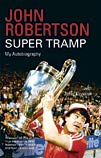 My Autobiography
My Autobiography
by John Robertson
Mainstream, £17.99
Reviewed by Geoff Wallis
From WSC 298 December 2011
In his preface to WH Davies's The Autobiography of a Super-Tramp, first published in 1908, George Bernard Shaw revealed that he did not know whether to describe its Welsh subject as "a lucky man or an unlucky one". A century later this autobiography by the self-styled "chubby little lad from Uddingston" insists that luck played a major role in his sporting career, albeit luck offset by life-changing misfortunes in his personal life – his first daughter was born with cerebral palsy and died at a young age, and his elder brother was killed in a car crash in 1979.
Of course, the second best player to emerge from Uddingston in Lanarkshire, after Celtic winger Jimmy Johnstone, was never an actual hobo. However, his avowed aversion to a razor and his diet of fags, booze and junk-food once led manager Brian Clough to remark in his own autobiography: "John Robertson was a very unattractive young man. If one day, I felt a bit off-colour, I would sit next to him. I was bloody Errol Flynn in comparison."
Robertson, who played in the same Scotland schoolboys team as Graeme Souness, was signed by Forest as a 15-year-old in 1968. He shared digs with Duncan McKenzie ("even in those days… a bit of a motor-mouth") and, because he was registered as an amateur, worked as a delivery boy for the company that produced the club programmes. He was a central midfielder, making his Forest debut in a 1970 victory over Blackpool. He briefly flourished under Dave Mackay, before sinking under the inept Allan Brown, who put him on the transfer list.
His hopes seemed likely to diminish further once Clough appeared, but local reporter John Lawson advised the new manager that Robertson could certainly play "but perhaps needed a kick up the backside". Said remonstration came with the arrival of Peter Taylor and his assertion that: "It's clear that you have problems, but we think you can play." This led the now left-winger to realise: "I knew I was a good footballer, I knew I was not getting the best out of myself." Over the following four years Robertson became the hub of Forest's domestic and European successes and a mainstay of the Scotland national team.
Lawson, the man who offered said sage advice to Clough, has drawn on all his literary strengths and local knowledge to assist Robertson in recounting his background, setbacks and accomplishments. Forest fans will certainly enjoy a relatively fresh insight into Clough and Taylor's management style and its sometimes fractious results. However, apart from mentioning his role as a scout for his long-time buddy Martin O'Neill (who provides a typically eloquent and incisive foreword to the book), the chubby one reveals absolutely nothing about his own tactical input as an assistant manager. So fans of Leicester, Aston Villa and Celtic will learn little about Robertson's role in their teams' successes or otherwise.